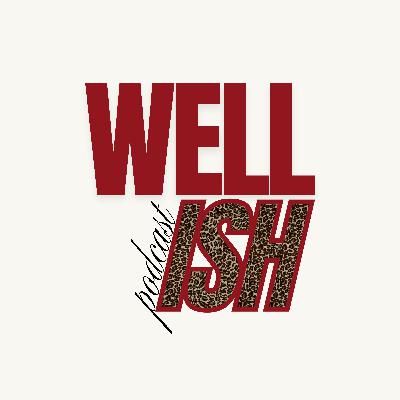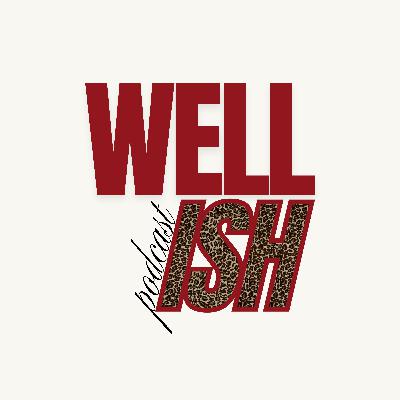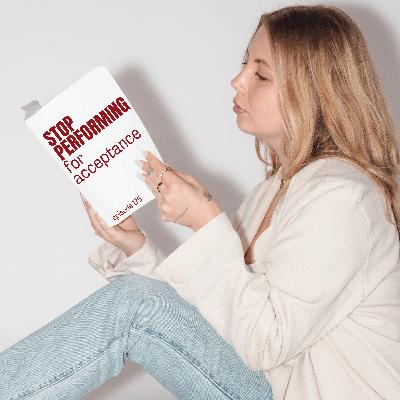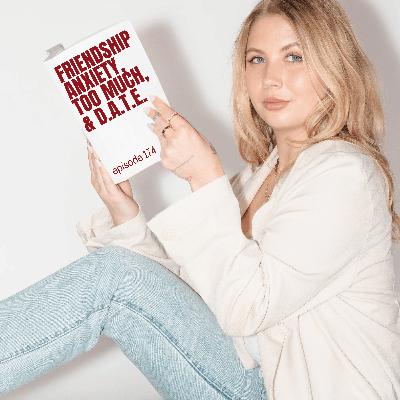Discover Wellish
Wellish

Wellish
Author: Sarah Ritondale
Subscribed: 2Played: 327Subscribe
Share
© Sarah Ritondale 2022
Description
Wellish is a movement for imperfect people to feel good enough. Here we test what actually works, share what doesn't, and push back against the perfect, aesthetic version of growth. Narrative journalist Sarah Ritondale leads a movement of women choosing to evolve without the pressure to be perfect. If you're healing, growing, or just trying to feel good enough in real life, you're already one of us. Welcome to a new kind of self-improvement -- one that feels like friendship, not a checklist.
195 Episodes
Reverse
We talk about glow-ups like they’re visible — new wardrobes, better apartments, a life that photographs well. But the kind of transformation that actually changes your life happens in silence. In this episode, Sarah explores the difference between the algorithmic glow-up — the one everyone can see — and the soul glow-up — the one only you can feel. It’s about learning to like yourself in private, trusting the growth no one notices, and redefining what transformation really means.
You can’t “heal” perfectly. You can’t “manifest” perfectly. And you definitely can’t “surrender” perfectly — but that doesn’t stop so many of us from trying.In this episode, Sarah breaks down the hidden perfectionism that’s taken over modern spirituality — the pressure to meditate daily, feel high-vibe, never spiral, and always “trust the universe.” She explores how this obsession with getting it right actually blocks connection, intuition, and meaning.Instead, she offers a gentler, truer path: one rooted in embodiment, intuition, and imperfection as spiritual practice. You’ll learn how to release the pressure to perform your growth, find the sacred in your everyday life, and reconnect with spirituality in a way that actually feels real.Because the most spiritual thing you can do isn’t to transcend your humanity — it’s to live it.
What if the real transformation isn’t about doing more—it’s about finally slowing down enough to ask why you’re doing it at all? In this soulful convo, Sarah sits down with writer and author Ashley Jordan (Unhappy Achiever) to explore what happens when success stops satisfying, self-improvement becomes another mask, and “becoming” quietly turns into self-rejection. Ashley shares the moment her biggest career win felt…numb, how grief cracked her open, and why the path forward is an unbecoming—peeling back perfection, releasing the “good girl,” and choosing a life that feels aligned over one that only looks the part.You’ll hear the messy, human side of healing: friendship fallouts, dating from dignity (no more accepting leftovers as love), redefining success as love and aliveness, and how to build a life from the inside out. If you’ve checked every box and still feel that quiet ache of “Is this really it?”, this episode will feel like a deep breath.We cover:The moment achievement stopped working—and what came afterWhy chasing “better” can be a subtle form of self-abandonmentUnbecoming vs. becoming (and why the ego can’t drive)Grieving old identities without hating your past selfCommunity, sisterhood, and finding alignment in everyday ritualsConnect with Ashley: Website: ashjordan.com Instagram: @missashjordan Book: Unhappy Achiever: Rejecting the Good Girl Image and Reclaiming the Joy of Inner Fulfillment (Amazon + wherever books are sold)If this episode hit home: share it with a friend who’s tired of performing wellness and ready to feel well-ish. 💫
You don’t manifest signs by chasing them — you receive them by softening.In this episode, Sarah explores the energy shift that makes synchronicities start showing up everywhere. You’ll learn how to move from control into receptivity, rebuild trust with your intuition, and understand why signs appear only when you’re finally open enough to notice them.This isn’t about magical thinking — it’s about getting quiet enough to hear what’s been whispering to you all along. When you stop gripping and start trusting, life starts reflecting your alignment right back to you.
What if your higher self isn’t someone you’re chasing — but someone you’re remembering? In this reflective Wellish compilation, Sarah revisits past guest conversations that reveal what becoming your higher self actually looks like in real life: the breakdowns, the surrenders, and the quiet shifts that turn healing into transformation.Through raw, soulful clips and her own reflections, this episode explores the subtle art of self-evolution — how to live as your higher self now, without waiting for perfect.
You know that fantasy where you wake up one morning as the “new you” — glowing, healed, unbothered, journaling at sunrise? Yeah… that’s not how it actually works.In this week’s episode, I'm calling BS on the myth of the overnight transformation. Real change doesn’t come from a lightning bolt moment, it comes from a thousand tiny, unglamorous choices you make when no one’s clapping for you. The nights you say no when you want to say yes. The mornings you show up when no one’s watching. BUT, while you may have to be patient to see grandiose transformation, I'm filling you in on how you can feel like your most aligned self NOW. I'm sharing her own messy, non-linear glow ups, the psychology behind slow change, and why chasing “instant results” is the fastest way to stay stuck. Consider this your reminder that becoming that girl isn’t about perfection, it’s about patience, proof, and choosing yourself in the most boring moments.Because the truth is: the quiet work is what makes you radiate transformation..
In this Wellish conversation, I'm sitting down with Erica Bonham — licensed professional counselor, somatic and attachment-focused EMDR trainer, and author of Always Enough, Never Done — to explore why healing can’t be thought into existence.Together, we're dive into the messy, liberating truth that self-criticism and overthinking don’t create transformation. Instead, real healing asks us to trust the body’s wisdom, practice radical self-compassion, and make peace with imperfection.This episode unpacks:Why your brain alone can’t heal trauma — and what the body knows that the mind can’tThe neuroscience of emotional regulation and why self-criticism backfiresThe dance between self-reflection and self-compassion in personal growthBoundaries that connect vs. boundaries that isolateThe impact of ancestral trauma on both individual and collective healingHow to hold space for pain without getting stuck in toxic positivityWhy embracing uncertainty and mystery is central to growthIf you’ve ever felt like you’re “bad at healing” because you still get triggered or spiral into old patterns, this conversation is here to remind you: healing doesn’t require perfection — it requires compassion, embodiment, and being just wellish enough.Resources:Poly Vagal Nerve ExercisesSigned Book Always Enough Never DoneWork with Erica!
We’ve all had those breakthrough moments — the hidden narrative clicks, you realize you’re done with the old story, and you declare your new one. So you listen, watch, and read all of the things so you understand how to become your new narrative. But no matter what you do, nothing feels different. Why? Because awareness isn’t embodiment. Your knowledge to skill gap is too large. In this Wellish conversation, I break down why knowing your patterns isn’t enough, and how to actually become the person in your new narrative. We’ll talk about:Why your brain resists change (and how that’s not a failure, it’s biology).The gap between thought and identity — and why affirmations alone don’t work.Micro-actions that build proof for your new story.Rituals, anchors, and daily practices that move awareness into your body.The messy middle of change — how to keep going when you slip into old patterns.If you’ve been stuck in awareness mode, this episode is your roadmap to embodiment. Because transformation isn’t about thinking your way there — it’s about living a little more like her every single day.
Perfectionism, comparison, and waiting for validation can keep us trapped in old stories. In this Wellish conversation, I’m sitting down with Brandon Keith Osborn—filmmaker, photographer, writer, and founder of For Real Life—to explore how rewriting your narrative creates room for authentic growth.Brandon shares his story of creative ambition, addiction, and identity struggles, and how fatherhood and therapy pushed him toward honesty, sobriety, and sustainable success. We dig into the cultural narratives of “tortured artist” and hustle culture, the shame of letting people down, and the identity work required to believe a new story about yourself. Brandon also unpacks how he shifted from running away from pain to moving toward purpose, why starting small matters more than perfection, and the “three wins a day” mindset that keeps him grounded.If you’ve ever felt like your potential was trapped under self-doubt, comparison, or messy mistakes, this episode is proof that your lowest lows can become the notes you draw from to create something real, resilient, and yours.Topics: narrative reframing, identity work, authenticity, addiction & recovery, perfectionism, comparison trap, creative growth, self-compassion, storytelling for healing, small wins habitResources: Brandon Keith Osborn — IG: @forreellife • forreel.life
In this episode of Wellish, I dive into what I’ve been learning about how our thoughts create our reality—and how I’m putting it into practice in my own life. I open up more than I ever have about my past relationship, the dynamics with my ex, and the deep-rooted beliefs about myself that I’m actively healing.Through raw stories and everyday examples, I show how the narrative we tell ourselves doesn’t just stay in our head—it shapes our entire experience. This isn’t about “magical thinking.” It’s about realizing that your thoughts are the starting point, and your reality follows. By shifting the way we interpret moments—whether it’s how we interpret a rainy day, how we show up socially or our deep rooted beliefs about ourselves and what we deserve—we can start creating the life we actually want.If you’ve ever struggled to believe that changing your thoughts could change your life is something that could feel real and doable, this episode will help you bridge that gap. I share my personal take on how rewriting your inner story can reshape your present, heal your past, and open the door to a different future.
Letting go heals faster than trying harder. In this Wellish conversation, I am sitting down with Alisha Kapani, a mind–body mentor and quantum health coach, to unpack why hyper-control and hustle can keep you stuck. Alisha shares her story of depression and social anxiety, how “giving up” softened her resistance, and the moment she followed intuition into mind-body medicine and theta healing. We dig into the biology (fight-or-flight vs. parasympathetic), the feminine energy first approach to processing emotions, and Alisha’s 3-step A.B.C. Tool—Awareness, Breath, Conscious Choice—for nervous system regulation you can use today. We also talk self-abandonment, unconditional self-love vs. conditional fixing, manifestation detachment (yes, my feather story), and how the mirror neuron effect accelerates growth when you learn from embodied expanders. If you’ve been doing “all the things” and still feel stuck, this episode reframes healing from forcing to aligned action, so your body can do what it’s designed to do: heal.Topics: surrender vs control, emotional processing, identity & beliefs, intuitive guidance, trauma healing, depression recovery, nervous system regulation, quantum healing, feminine/masculine balance, practical practices for everyday life.Resources: Alisha Kapani — IG: @alisha_kapani • alishakapani.com (FREE mind–body tools and theta healing info)
When you hear the word “manipulation,” you probably think of toxic exes, narcissists, or evil a**holes. But the truth is we all may be more guilty of manipulation that we realize, and it’s often happening without us even knowing it. In this episode of Wellish, I'm breaking down the subtle, everyday ways we manipulate (and get manipulated), why it’s rooted in fear, and how these patterns quietly make life harder. From people-pleasing to guilt trips to fishing for reassurance, you’ll learn how to recognize the signs and start showing up with more honesty and less control.
In this special episode of Wellish I’m putting myself in the hot seat! Think of this as an unfiltered get to know me - the stories, quirks, confessions you don’t hear in the self improvement episodes to help you get to know me outside of the personal growth talk!
What does it actually mean to be good enough? It's something we battle with and hear constantly, but when I sat back with that concept I realized I didn't even really know what that meant to be "good enough". What I did know is I allowed the constant need to feel good enough to play too much of a negative role in who I was and how I was showing up in my life. In order to make any progress on a certain area we first need to understand what it is, where it came from and why it's happening. That is what we are covering in this week's episode. I break down all of the areas we have been exposed to throughout our lives that have contributed to our feelings of not enoughness and the psychology that plays into the topics. I cover self esteem vs self worth, perfectionism, and research from child psychoanalyst Donald Winnicott. And of course we discuss how to flip the question of "am I good enough?" to something that stops us from constantly auditioning for worth. If you've ever wondered when you'll finally feel you're enough, this conversation is for you.
Living alone (or just being alone) comes with both freedom and frustration. In this episode I explore the good -- the grounding, the independence, the chance to build a life on your own terms -- and the bad --the boredom, the lonliness, the temptation to fill every quiet space with distractions. Then we'll dive deeper into the real question: are you using this time alone to connect with yourself, or just waiting for it to be over? Because if you don't learn how to befriend yourself now you'll risk abandoning yourself the second someone else walks into your life.
On Wellish, we’re not here to blindly follow every self-improvement trend — we’re here to question them. This week, I’m diving into TikTok’s newest obsession: monthly curriculums.Are they a genius way to learn, grow, and add structure to your life — or just another self-optimization spiral dressed up as self-care? I’ll break down what the trend is, who it’s for, and why people love it… but also where it can go wrong.I’ll share how I’ve been running my own journalism curriculum (and the surprising ways it’s boosted my confidence and creativity), and most importantly: how to keep this trend Wellish approved. No grades. No pressure. Just curiosity, growth, and the freedom to make it your own.
You don’t have to hustle yourself into the ground to create the life you want—but you also can’t just wait for it to magically fall into your lap. In this episode, we're exploring the sweet spot between toxic productivity and hopeless surrender, and how to close the gap between your current self and your dream self without burnout or perfectionism.We’ll break down the psychology behind why we get stuck (hello, learned helplessness), the nervous system science that explains why more motivation isn't the answer, and the identity shifts that make change stick. From identifying what stage of change you're currently at to expanding your window of tolerance, this conversation will help you step into your desired reality with more calm, clarity, and confidence—one aligned action at a time.If you’ve ever thought, “I know what I want, so why am I not doing it?”, this episode is your permission slip to build a life that fits you, not the other way around.
What if you stopped performing for love? In this raw and deeply relatable episode, I'm cracking open the fear of stillness, the pressure to be impressive, and the subtle ways we perform just to feel worthy. From spiraling after a chill weekend to curating confidence after heartbreak, this one is for the overthinkers, the perfectionists, and the ones who secretly feel like they have to "earn" their place in someone’s life.Whether you're healing from conditional love, navigating post-breakup identity, or just trying to feel okay doing nothing—you’ll walk away feeling seen. It’s not about willpower. It’s about believing you’re enough, even when you’re not impressive.📌 Plus: a juicy listener question about a “slow burn” or an emotional support situationship you need to weigh in on.
Just because you’re not being fake doesn’t mean you’re being real. This week, we’re untangling the difference between comfort and authenticity—and why the truest version of you might not feel natural at first. I’m sharing stories about showing up loudly, being labeled “scary” (aka confident) by men, and realizing that what I thought was growth was actually just survival mode.We’re breaking down:The myth that discomfort = inauthenticityHow nervous system dysregulation can make confidence feel impossibleWhy confidence isn’t polished—it’s raw, messy devotion to your real selfWhat to do when the version of you you’ve always fantasized about finally shows up—and feels fakeThis is your permission to stop calling your loud, vibrant, too-much self “too much.” She’s not fake—she’s free.PLUS: I answer a listener’s question on how to tell the difference between healing solitude and accidental isolation.
This week’s episode is a full-blown spiral turned breakthrough.First, I’m breaking down the friendship anxiety no one talks about—the kind that doesn’t hit during the hangout, but after, when you’re stuck replaying everything you said and wondering if you were too much.Then, we’re talking about what it really means to be “too loud,” “too emotional,” or “too sensitive”—and how being told I’m too much my whole life made me start shrinking myself without even realizing it.Finally, I’m sharing the secret formula I’ve been using to create a life that actually feels full—without burning out or trying to become a brand-new person overnight. (Spoiler: it’s called the D.A.T.E. method and it might change your life.)This one’s messy, honest, and low-key healing. If you’ve been feeling like you're spiraling, shrinking, or just going through the motions… this one’s for you.




















